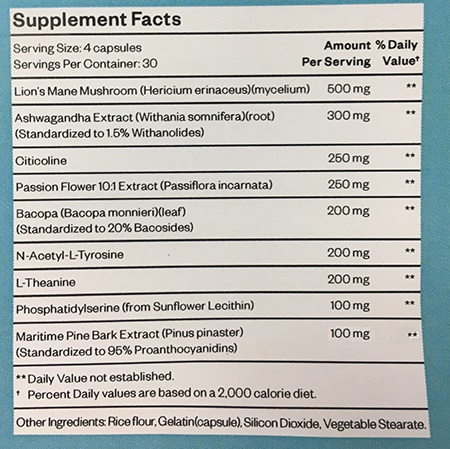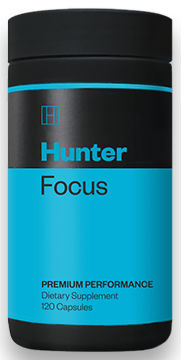Hunter Focus is a nootropic from Hunter – a “premium” supplement brand. Each bottle contains 120 capsules (30 daily servings) and retails for $75.
This nootropic claims to help you:
- Increase concentration
- Focus for longer
- Think more creatively
- Work for longer
While there are some pretty good nootropics out there, none have blown us away. Can Hunter Focus be the brain booster we’ve been looking for?
About the Company
Hunter is a specialist supplement brand. It’s based in the UK and has dedicated distribution centers in both its home country and the US.
Just three products bear the Hunter name: Hunter Burn (fat burner), Hunter Test (testosterone booster) and Hunter Focus.
“Less is more”
Why does Hunter offer so few products? Well, the guys behind the brand say the small range allows them to maintain a hands-on approach that ensures complete quality.
Hunter supplements are only available through the official brand website. As a result, you won’t find Hunter Focus at the strip mall or elsewhere online. We weren’t fans of this approach at first, because we like hunting for bargains.
But Hunter says this direct model cuts out the cost of paying a maze of retailers, which in turn allows the brand to plow all its resources into making the best products.
To be fair, this makes sense. Having reviewed hundreds of supplements, we’ve noticed how many brands pay so little attention to detail and create hundreds of sub-par products. If Hunter is as different as it seems, then it’s looking good for this nootropic…
Ingredients and How They Work
Hunter Focus is made up of 9 popular ingredients that you’ll find in many similar types of product.
One great difference is that while many popular nootropics hide crucial dose info in proprietary blends, Hunter Focus uses a transparent formula.
See for yourself:

Lion’s Mane Mushroom
Lion’s Mane Mushroom is a potent brain tonic.
Its active ingredients are hericenones and erinacines – polysaccharide metabolites which stimulate Nerve Growth Factor (NGF) in the brain[1]. As a result, Lion’s Mane Mushroom is able to repair and renew damaged neurons.
This boosts neurotransmitters, improves the signals between neurons[2], and enhances your mental energy, powers of recall, and scope for learning.
All of this makes Lion’s Mane Mushroom the perfect if you’re not feeling as sharp as you once were, but you still want to stay ahead of the pack.
Ashwagandha Extract
Ashwagandha is described by Examine.com as the “king of the Ayurvedic herbs”[3] – and rightly so. In Sanskrit, its name literally translates as “smell of horse.” This is because the herb is said to give users the vigor and strength of a horse.
Research shows Ashwagandha regenerates the dendrites and axons in your brain[4] to keep your mind sharp for longer. It’s also a potent adaptogen which lowers cortisol levels and helps you stay cool under fire.
Citicoline
Otherwise known as CDP-Choline, Citocoline splits into Choline and Cytidine when ingested[5].
Your body uses Choline to synthesize Acetylcholine, a neurotransmitter (which sends messages between neurons). This improves your memory, powers of recall and learning capacity[6].
The body also uses Cytidine to synthesize Uridine, which (especially in combination with DHA – a fatty acid) repairs brain cells[7] to help you stay sharp as you age.
Citocoline also improves your mood, which in turn helps you think clearly and improves reaction times[8].
Passion Flower
Passion Flower (or Passiflora) is an anxiolytic plant – in other words, it reduces stress. It’s shown to improve sleep quality by raising GABA levels in your brain[9].
And by promoting the release of dopamine[10], it also improves your sense of well-being.
Bacopa Monnieri
Bacopa Monneiri (aka Brahmi) is a perennial herb, a potent stress-reliever and a noted brain booster. It’s rich in bacosides A and B, which help keep you calm under stress[11].
These active ingredients can also cross the blood-brain barrier, increase cerebral blood flow and helps keep your brain healthy as you age[12].
The result? Your reaction times increase, you absorb information more readily, and you develop better powers of recall[13].
See Supplement Tester’s
Highest-Rated Nootropics Here
N-Acetyl-L-Tyrosine
N-Acetyl-L-Tyrosine (NALT) is shown to improve processing speed, enhance your memory and ramp up your problem-solving skills[14]. The amino acid even helps reduce mental fatigue[15] to ensure you keep your eye on the prize and hit all your targets – every time.
NALT works by increasing the levels of key neurotransmitters like dopamine, epinephrine and norepinephrine[16].
L-Theanine
L-Theanine derives from Green Tea – and it’s an awesome nootropic. By increasing the levels of serotonin, dopamine, it boosts mental energy and encourages clear thinking[17].
The non-dietary amino acid increases alpha brain waves to induce a ‘calm alertness’ that helps you sleep better. This process also feeds your imagination and makes you better able to solve complex problems – even when under stress.
Phosphatidylserine
Phostphatidylserine (PS) is a fatty substance (phospholipid) which encases every cell in your brain to improve plasticity (brain health)[18].
Phostphatidylserine also improves the transfer of glucose, oxygen and other vital nutrients to and from each cell[19].
All of this reduces age-related cognitive decline and helps keep your mind in peak condition for many years to come. It also ensures you can concentrate better, think clearer and expand your ability to learn.
PS also raises acetylcholine levels in your brain[20] to lift your mood, reduce anxiety[21] and further improve your memory[22].
Maritime Pine Bark Extract
Maritime Pine Bark Extract is packed full of proanthocyanidin compounds (OPC), which boast potent anti-aging[23], anti-carcinogenic and anti-inflammatory[24] effects.
Because it’s so rich in healthy nutrients, Maritime Pine Bark can improve focus, memory and concentration[25].

See Supplement Tester’s
Highest-Rated Nootropics Here
Hunter Focus Side Effects
As recommended by the makers of Hunter Focus, we tested the nootropic for the full 90 days. During that time, we did not experience any adverse side effects.
In fact, this is one of the many reasons it has become our go-to nootropic.
As the ingredients in Hunter Focus are so well-tested, you’re also unlikely to experience side effects (unless you’re allergic to any of its ingredients).
Pros and Cons
Pros:
- Nine ingredients backed by solid research
- Could assist energy, drive and determination
- Ingredients are prepared to strict cGMP and FDA regulations
- Unlikely to cause side effects
- Transparent formula – clear dosage info lets you know you’re getting great ingredients in the right amounts
Cons:
- Expensive – $75 is a high price to pay
- Non-vegetarian – animal-based capsule
- Only available online
See Supplement Tester’s
Highest-Rated Nootropics Here
Hunter Focus Review Conclusion
Hunter Focus has to be the best pre-made nootropic we’ve ever tested – and we’ve tried a lot!
What’s bad about it?
Hunter Focus ain’t cheap – at $75, it’s not for bargain hunters. It’s also a little disappointing that the capsules are non-veggie. That said, many of our vegetarian colleagues seem happy enough to remove the powder from the capsules before taking them.
What’s great about Hunter Focus?
When it comes to brain-boosting, the most important part of any pre-made nootropic is the ingredients – if they don’t measure up, then forget it! And that’s the issue with most of these products; they’re crammed with untested ingredients with little or no science to back them.
Luckily, Hunter Focus uses nine very well-researched ingredients. The brains behind Hunter also realize dosages are just as important as ingredients – and this nootropic holds more or less the ideal amounts of each nutrient.
Our verdict
This product beats other pre-made nootropics we’ve tried in almost every way. With this in mind, we give Hunter Focus 5/5.
To find out more or buy Hunter Focus, visit the official website here
References
- Bing-Ji, M et al. Hericenones and erinacines: stimulators of nerve growth factor (NGF) biosynthesis in Hericium erinaceus. Mycology: An International Journal on Fungal Biology Volume 1, 2010 – Issue 2
- Brandalise, F et al. Dietary Supplementation of Hericium erinaceus Increases Mossy Fiber-CA3 Hippocampal Neurotransmission and Recognition Memory in Wild-Type Mice. Evid Based Complement Alternat Med. 2017; 2017: 3864340. Published online 2017 Jan
- Frank, K. et al (2018). Ashwagandha Research Analysis. [online] Examine.com. Available at: https://examine.com/supplements/ashwagandha/ [Accessed 25 Sep. 2018].
- Kuboyama, T. et al. Neuritic regeneration and synaptic reconstruction induced by withanolide A. Br J Pharmacol. 2005 Apr; 144(7): 961–971. Published online 2005 Feb 14.
- Grieb, P. Neuroprotective Properties of Citicoline: Facts, Doubts and Unresolved Issues. CNS Drugs. 2014; 28(3): 185–193. Published online 2014 Feb 7.
- Hasselmo, ME. The Role of Acetylcholine in Learning and Memory. Curr Opin Neurobiol. Author manuscript; available in PMC 2009 Mar 24.
- Wurtman, R. (2014). A Nutrient Combination that Can Affect Synapse Formation. Nutrients, 6(4), pp.1701-1710.
- Bettini, R and Gorini, M. [Reaction times during citicoline treatment]. Clin Ter. 2002 Jul-Aug;153(4):247-50.
- Elsas, S-M et al. Passiflora incarnata L. (Passionflower) extracts elicit GABA currents in hippocampal neurons in vitro, and show anxiogenic and anticonvulsant effects in vivo, varying with extraction method. Phytomedicine. Author manuscript; available in PMC 2011 Oct 1.
- Toda, K et al. Passionflower Extract Induces High-amplitude Rhythms without Phase Shifts in the Expression of Several Circadian Clock Genes in Vitro and in Vivo. Int J Biomed Sci. 2017 Jun; 13(2): 84–92.
- Sheikh, N et al. Effect of Bacopa monniera on stress induced changes in plasma corticosterone and brain monoamines in rats. J Ethnopharmacol. 2007 May 22;111(3):671-6. Epub 2007 Jan 30.
- Calabrese, C et al. Effects of a Standardized Bacopa monnieri Extract on Cognitive Performance, Anxiety, and Depression in the Elderly: A Randomized, Double-Blind, Placebo-Controlled Trial. J Altern Complement Med. 2008 Jul; 14(6): 707–713.
- Roodenrys, S et al. Chronic effects of Brahmi (Bacopa monnieri) on human memory. Neuropsychopharmacology. 2002 Aug;27(2):279-81.
- Shurtleff, D et al. Tyrosine reverses a cold-induced working memory deficit in humans. Pharmacol Biochem Behav. 1994 Apr;47(4):935-41.
- Neri, DF et al. The effects of tyrosine on cognitive performance during extended wakefulness. Aviat Space Environ Med. 1995 Apr;66(4):313-9.
- Research, I. and Marriott, B. (2018). Tyrosine and Stress: Human and Animal Studies. [online] Ncbi.nlm.nih.gov. Available at: https://www.ncbi.nlm.nih.gov/books/NBK209061/ [Accessed 26 Sep. 2018].
- Higashiyama, A et al. Effects of l-theanine on attention and reaction time response. Journal of Functional Foods. Volume 3, Issue 3, July 2011, Pages 171-178.
- Kim, H-Y et al. Phosphatidylserine in the Brain: Metabolism and Function. Prog Lipid Res. Author manuscript; available in PMC 2015 Oct 1.
- Hirayama, S. et al (2013). The effect of phosphatidylserine administration on memory and symptoms of attention-deficit hyperactivity disorder: a randomised, double-blind, placebo-controlled clinical trial. Journal of Human Nutrition and Dietetics, 27, pp.284-291.
- Pedata, F. et al (1985). Phosphatidylserine increases acetylcholine release from cortical slices in aged rats. Neurobiology of Aging, 6(4), pp.337-339.
- Parker, AG et al. The effects of IQPLUS Focus on cognitive function, mood and endocrine response before and following acute exercise. J Int Soc Sports Nutr. 2011 Oct 21;8:16.
- Crook, T. et al (1991). Effects of phosphatidylserine in age-associated memory impairment. Neurology, 41(5), pp.644-649.
- Furumura, M. et al (2012). Oral administration of French maritime pine bark extract (Flavangenol®) improves clinical symptoms in photoaged facial skin. Clinical Interventions in Aging, p.275.
- Pinus pinaster bark extract may have a beneficial effect on memory in elderly individuals,. (2008). Inpharma Weekly, &NA;(1630-1631), p.11.
- Belcaro, G et al. Maritime Pine Bark improves cognitive function, attention, mental performance and specific professional skills in healthy professionals aged 35-55. Journal of Neurosurgical Sciences. Volume 58, No. 4, December 2014, Pages 239-248
